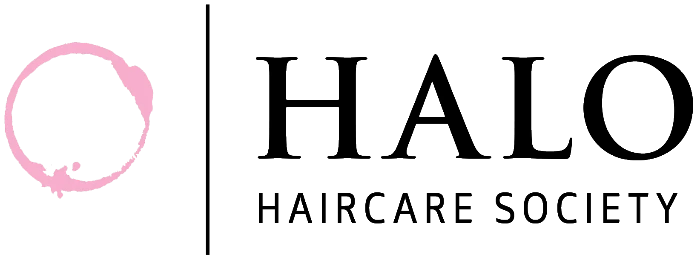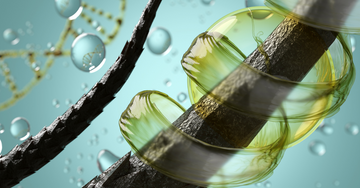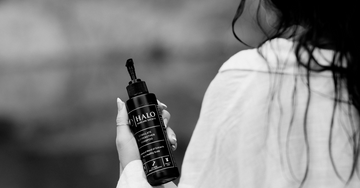PCOS and Hair: Understanding the Connection, Symptoms, and Ways to Support Your Hair and Health
Polycystic Ovary Syndrome (PCOS) is a common hormonal disorder affecting millions of women worldwide. Among its many symptoms, hair-related issues are a significant concern, including hair loss, hirsutism (excess hair growth in unwanted areas), and thinning hair. Managing these symptoms effectively involves understanding PCOS’s relationship with diet, hormones, and inflammation—and how you can take proactive steps to minimize its impact on hair health.
What is PCOS and How Does it Affect Your Hair?
PCOS is a hormonal imbalance that disrupts normal ovulation and leads to an overproduction of androgens, including testosterone. High androgen levels can trigger two key hair issues in women:
-
DHT-Related Hair Loss: In individuals predisposed to androgen sensitivity, high testosterone levels can convert into DHT (dihydrotestosterone), a hormone known to shrink hair follicles on the scalp and contribute to hair thinning or hair loss, especially around the crown and temples.
-
Hirsutism: Excess androgen levels can also cause hirsutism—excessive hair growth in areas where women typically have less hair, such as the face, chest, and back. This can be distressing, leading many women to seek treatments to balance hormones and reduce unwanted hair growth.
Key Symptoms of PCOS-Related Hair Issues
Along with hair concerns, PCOS often presents other symptoms that can impact both health and well-being:
- Irregular menstrual cycles
- Acne and oily skin
- Weight gain, especially around the abdomen
- Insulin resistance, which can lead to prediabetes or Type 2 diabetes
- Mood changes and fatigue
How Diet Impacts PCOS and Hair Health
Diet plays a critical role in managing PCOS symptoms, as certain foods can exacerbate insulin resistance, increase inflammation, and worsen hormonal imbalances. Here’s how adjusting your diet can make a difference:
-
Reducing Inflammatory Foods: High-sugar, processed foods can spike insulin levels and contribute to chronic inflammation. Reducing or avoiding foods like refined carbs, sugary drinks, and highly processed foods can help stabilize insulin and reduce inflammation.
-
Choosing Low-Glycemic Foods: A low-glycemic diet (rich in non-starchy vegetables, whole grains, and lean proteins) helps prevent insulin spikes, stabilizing hormone levels. Examples include leafy greens, sweet potatoes, quinoa, lean poultry, and healthy fats like avocados.
-
Increasing Anti-Inflammatory Nutrients: Foods rich in omega-3 fatty acids, antioxidants, and fiber can reduce inflammation and support hormone balance. Omega-3s from sources like salmon, walnuts, and flaxseeds have been shown to improve androgen levels and lower inflammation.
-
Balancing Blood Sugar: Avoiding large blood sugar fluctuations is essential for managing PCOS. Eating smaller, balanced meals with proteins and healthy fats can help maintain energy levels and control hunger, which is often disrupted in PCOS due to insulin resistance.
Reducing PCOS Flares with Internal Changes
Minimizing PCOS-related hair issues involves reducing androgen levels and managing inflammation. Here are some strategies to support these goals:
- Incorporate Supplements: Certain supplements, like Inositol, Zinc, and Omega-3s, have shown promise in supporting insulin sensitivity and lowering androgen levels in women with PCOS.
- Regular Physical Activity: Exercise helps reduce insulin resistance, supports weight management, and reduces inflammation. Aim for a mix of cardio, strength training, and stress-reducing activities like yoga.
- Prioritize Sleep and Stress Management: Chronic stress can increase cortisol levels, which may aggravate PCOS symptoms. Regular sleep and relaxation practices are essential for hormone balance.
How to Address Hair Loss from PCOS Externally
While dietary and lifestyle changes are essential for long-term management, external treatments can support scalp health and improve hair density. Here’s how you can address PCOS-related hair loss externally:
-
Topical DHT Blockers: Ingredients like saw palmetto, green tea, pumpkin seed oil, and caffeine can help reduce DHT on the scalp, slowing the progression of hair loss.
-
Low-Level Laser Therapy (LLLT): Light therapy can help stimulate hair follicles, increasing growth and reducing thinning. Regular LLLT sessions can help maintain hair density over time.
-
Gentle, Nourishing Hair Care: Use sulfate-free shampoos and conditioners with anti-inflammatory and soothing ingredients like colloidal oatmeal, aloe vera, and red algae. These ingredients help reduce scalp irritation and support the skin barrier.
-
Serums with Hair-Strengthening Ingredients: Look for serums with ingredients like green tea, red clover and caffeine that ignite hair growth, strengthen hair strands and improve follicle health.
-
Regular Scalp Massages: Massaging the scalp encourages blood flow, which can help nourish hair follicles and support healthier growth. Consider using a nutrient-rich oil or serum to enhance the benefits.
Building a hair care routine
When creating a treatment plan, consistency is key. It’s important to establish a routine that you can realistically stick to. Adding excessive steps that feel overwhelming or unsustainable will only hinder your progress. Instead, focus on choosing the steps below that fit seamlessly into your lifestyle and daily habits.
Styling Tools
Opt for gentle materials to minimize damage to fragile hair. Boar bristle brushes and natural combs are perfect choices, as they mimic the natural structure of your hair, reducing breakage and keeping strands smooth.
Scalp Pre-Treatment
Begin your wash day routine with Nourished By Oil and a relaxing scalp massage. This step not only boosts circulation—bringing nutrient-rich blood to your hair follicles—but also supports your skin barrier and follicle health, creating the ideal environment for healthy hair growth.
Cleanse
Choose a gentle cleanser with active ingredients that nourish and balance your scalp. Our Stimulate and Strengthen Shampoo is enriched with plant-based vasodilators and natural DHT blockers to improve blood flow, decrease the conversation of DHT related hair loss, and helps to regulate oil production, restoring harmony to your scalp.
Treatment
Incorporate Reinforcement into your routine for a dual-action boost. This treatment strengthens your hair structure while encouraging healthy blood flow to the scalp, supporting growth from within.
Conditioner
The right conditioner can make all the difference. For fine hair, try Strengthen and Shine for lightweight nourishment. Those with curls or prone to tangles will benefit from Kinks, Curls, and Coils, while Hydrated Halo is the perfect match for dry or coarse hair types in need of extra hydration.
Scalp Serum
For anyone experiencing thinning hair, Revitalise Scalp Serum is a must-have. Apply it daily to continuously promote growth, support scalp health, and condition your skin barrier for long-term benefits.
Extra Tips
If you’re in need of a deep cleanse or want to extend the time between washes, Rejuvenate Dust is your secret weapon. It doubles as a deep conditioner and helps make the most of your natural oils, giving you refreshed, healthy hair with minimal effort.
Managing Unwanted Hair Growth (Hirsutism) from PCOS
For hirsutism, certain topical treatments and lifestyle adjustments may help reduce hair growth:
- Topical Hair Growth Inhibitors: Creams containing eflornithine (available by prescription) can slow unwanted facial hair growth.
-
Electrolysis or Laser Hair Removal: These treatments can offer a more permanent solution to unwanted hair by targeting the hair follicles directly.
Final Thoughts
PCOS may pose challenges for hair health, but understanding the connection between diet, hormones, and inflammation can empower you to take control. Embracing a low-glycemic, anti-inflammatory diet, along with managing stress and using targeted external treatments, can help alleviate hair loss and other PCOS symptoms. By combining internal changes with effective topical treatments, you can support both your hair and overall well-being.
For more information on scalp care, hair loss prevention, and treatments, explore our resources on Halo Hair Care.





